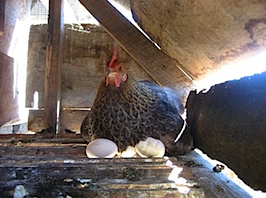The Guatemalan equivalent of the US Department of Agriculture is called the Ministerio de Agricultura, or “MAGA” for short. Being health volunteers, we don’t have much to do with them, but some Peace Corps Volunteers who work in crop security and ag projects do. When we started our long and tiring quest for some information on chicken vaccines, we were eventually pointed to MAGA. It’s better development practice to get host country technicians to give these kind of lectures, as it promotes self-sufficiency for the country.
After a few calls, Emily got ahold of the local MAGA representative in Huehuetenango. This was very exciting for us, as he is knowledgeable about chicken vaccines and has done vaccination campaigns and training before. He said he was willing to travel the five hours to our site, if we could gather the people together on the specified date and let him know how many chickens we were talking about. Yay! We talked it up with all the local leaders, and got numbers back for the amount of chickens in the surrounding villages– all told, over a thousand. “Um, one thing,” the MAGA guy told Emily toward the end of the conversation. “It’s kindof expensive to get out there. I’d like the villagers to pitch in to buy my gas.”
Emily and I talked it over after the got off the phone. What kind of government employee makes that sort of request? It sounded a little fishy, but we agreed that we needed this guy. We’d just pay him out of our own pocket, because it would take forever to get the villagers to all pitch in their 37.5 centavos each, or whatever they worked it out to.
The appointed day came, and the MAGA guy called. “Fijese,” he began. This word roughly translates to, “look here,” but amongst PCVs we assume it really means, “I’m about to lie to you.”
“Fijese, mi carro esta descompuesto. No puedo llegar. Tal vez en la semana que viene.” So, his car broke down and he can’t get here. Maybe next week. Disappointed, we called all the village leaders to tell the villagers not to come the next day.
Emily called the guy back the following week, to set up a new date. After a few dodged phone calls, he answered and told her that his car was still in the shop. ARE YOU KIDDING ME? What kind of government employee has his car in the shop for a week and can’t do any work? BORROW ANOTHER! Ugh. Then, at the end of the conversation, he had the gall to tell her that if the villagers could put together enough money to repair his car, he could come.
This is one of those things that is inconceivable in the “real world”, but is apparently pretty typical in third world nations with barely-operational governmental structures. We were was having dinner with Nas Palas and his family the next day, and somehow chickens came up, so I recounted this story to him as a way of explaining why we hadn’t gotten them the aid we’d been working for.
 “Yes, you will learn how things work here,” he began solemnly. “The people, the government people… they don’t help us. They don’t help the Maya. They work for the ladinos, in the cities. They never come here.” His expression was a mix of sadness and patient resignation, and it nearly broke my heart.
“Yes, you will learn how things work here,” he began solemnly. “The people, the government people… they don’t help us. They don’t help the Maya. They work for the ladinos, in the cities. They never come here.” His expression was a mix of sadness and patient resignation, and it nearly broke my heart.
“Perhaps they will come because we’ve invited them? Because we’re gringoes?” I replied hopefully.
“Perhaps,” he said, mostly to make me feel better.
Here is a picture I took last week of Henley II (or “Dos” for short), one of our three laying hens, in the coop a few days before she (and Speedy) died from a respiratory infection. We’re back down to one chicken.